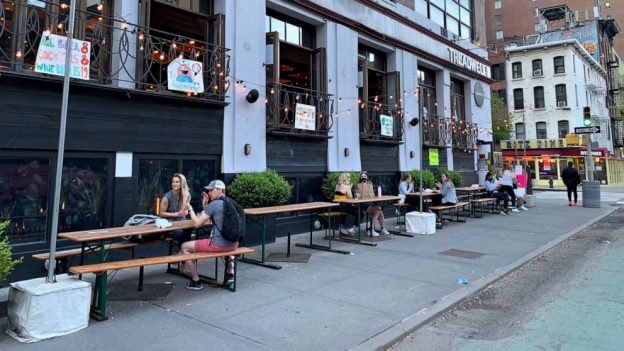Can a business be held responsible if an employee or customer gets the coronavirus?
The question is at the center of a brewing debate across the country as states begin reopening their economies as they seek to balance support for businesses with protections for workers and consumers.
In the nation’s capital, manufacturers, retail businesses and grocers are advocating for so-called “liability shields” in the next round of stimulus legislation on Capitol Hill, warning that without protections, struggling businesses could be hit with damaging lawsuits that could even discourage some from reopening.
Tune into ABC at 1 p.m. ET and ABC News Live at 4 p.m. ET every weekday for special coverage of the novel coronavirus with the full ABC News team, including the latest news, context and analysis.
While the issue isn’t a new one — and something industry and congressional Republicans have pushed for in the past — advocates say the unique and brutal impact of the coronavirus requires new reforms.
“This is a whole new world of legal liability,” Stephanie Martz, chief administrative officer and general counsel of the National Retail Federation, told ABC News. “It’s just potentially the Wild West.”
Hospitals and nursing homes — which have seen some of the deadliest outbreaks — are also advocating for liability protections as they work to care for patients and residents on the front lines of the coronavirus fight.
While more than a dozen states or governors have passed laws or orders giving nursing homes and long-term care facilities some measure of legal protection, “more needs to be done to afford appropriate legal protection to those that are working hard to prevent and contain this virus from spreading,” officials with the American Health Care Association said in a statement.
The White House has also signaled support for shielding some businesses from liability during the coronavirus crisis. President Donald Trump signed an executive order, telling meat processing plants to remain open under the Defense Production Act, and said the move would “solve any liability problems.”
“Some of it can be done through executive order or regulatory changes. Some of it might require legislation. We’re looking at it right now,” White House economic adviser Larry Kudlow recently told reporters.
Senate Majority Leader Mitch McConnell, R-Ky., called the issue a “red line” for Senate Republicans, and in a joint statement with House Minority Leader Kevin McCarthy, R-Calif., said protections are “absolutely essential” to protect businesses against a “second pandemic of opportunistic litigation.”
Democrats, along with organized labor and many trial lawyers, have opposed any changes, arguing that they would absolve businesses of protecting the health and safety of employees at a time when COVID-19 has hit the essential workforce.
“That means if a head of a company said, ‘You have to sit next to someone who has all the signs of COVID, without PPE,’ you can’t sue that boss. That encourages bad bosses to do just that,” Senate Minority Leader Chuck Schumer, D-N.Y., said on MSNBC on Monday.
Lobbyists for affected businesses and industries argue that they are seeking targeted, limited protections for the duration of the coronavirus, for new issues such as the handling of data by employers who start conducting temperature checks on employees.
The National Association Manufacturers, in their proposal to lawmakers, wants to limit lawsuits claiming damages based on COVID-19 exposure from all “essential manufacturing operations” to only episodes where manufacturers “had actual knowledge that an individual would be exposed” and were “acting with reckless indifference or conscious disregard.”
“We don’t want to be protecting bad actors. We want to be protecting employers who are doing their best to do the right thing with the knowledge they have,” Linda Kelly, senior vice president of the National Association of Manufacturers, told ABC News.
The Occupational Safety and Health Administration has issued guidance for businesses to protect employees from COVID-19, but it is not mandatory for employers to follow.
Democrats, along with organized labor groups and consumer advocates, are pushing the Trump administration to require all businesses to establish workplace protections, and are seeking to put the mandate in any future stimulus legislation, so Americans will feel secure they’ll be protected at work.
“It’s concerning that they’re spending all their time speaking about liability shields when what they should be doing is making sure there are protections in place when they reopen,” Yona Rozen, an associate general counsel at the AFL-CIO, said of the liability concerns raised by businesses. “That’s what the focus should be on. We’re not against reopening the economy, but you have to have the health and safety protections in place.”
Already, grocery stores, big-box retailers and meat processing plants have seen lawsuits from workers’ advocates and families of workers who have died from COVID-19.
But “it will be very difficult to prove in court that the company is liable,” Roger Schechter, a George Washington University Law School professor who teaches tort law, told ABC News.
Plaintiffs would have to prove that businesses “did not behave as a reasonably prudent company in a similar circumstance,” he said. “You have to prove that they did something stupid or something careless.”
The challenge of identifying how and where people become infected with COVID-19 — whether it’s at work, home or the grocery store — adds another legal hurdle.
“From the point of view of businesses, they don’t worry so much about whether or not they’re going to win their lawsuits, they worry about whether they’re going to have to defend the lawsuits in the first place,” Schechter said.
It’s not clear how soon Congress may act on the issue, or even if they will. With Democrats and Republicans still drafting their proposals for the next round of stimulus legislation, it’s possible they can reach some sort of compromise.
“There’s room to accommodate some of what each side wants,” Schechter told ABC News. “There’s room in the middle here.”

Comments are closed